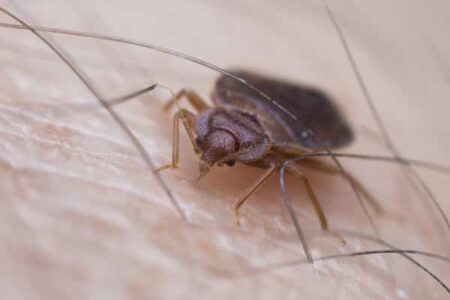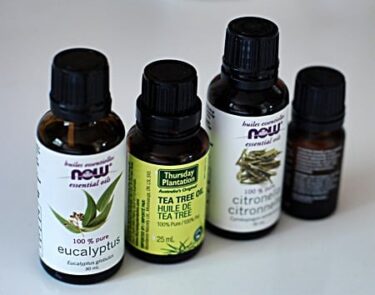If you’re wary of using synthetic chemicals to kill bed bugs, you may want to use a natural insecticide spray like tea tree oil. The only problem is that natural bed bug treatments aren’t usually as effective.
Tea tree oil is an insecticidal that kills bed bugs instantly, but the problem is that it requires direct contact to work. This renders it ineffective because bed bugs are very good at hiding.
Even though it kills some bed bugs, that’s not really enough because bed bugs reproduce quickly. You can learn how to kill bed bugs with tea tree oil, but it’s not an easy task to get rid of them permanently.
Does Tea Tree Oil Kill Bed Bugs?
Tea tree oil does have insecticidal effects. On direct contact, tea tree oil of various concentrations can get rid of both bed bugs and their eggs/larvae.
Tea tree oil works by soaking into the bed bug’s exoskeleton. Bed bugs, like other insects, don’t breathe. Rather than having lungs that absorb oxygen from the air, bed bugs have many ducts leading to their exoskeleton. Air flows in and out of these ducts, which is how bugs ‘breathe’.
The idea behind using tea tree is that it blocks up these ducts and stops the bed bug from breathing. It will suffocate quite quickly upon contact. But there are several problems with using tea tree oil to treat bed bugs.
Tea Tree Oil and Bed Bug Scientific Studies
The journal RSP found that while tea tree oil isn’t as effective as commercial pesticides, it can still kill some insects. However, to get rid of an infestation, you must kill every bed bug because they breed so quickly.
A study in the journal Insects looked at a spray called EcoRaider, which contained a variety of essential oils, including tea tree. They found that it was as effective as normal pesticide contact killers.
How to Make Tea Tree Oil Spray for Bed Bugs
Your tea tree oil bed bug spray recipe should be simple. You don’t need to add lots of different ingredients, and pure tea tree oil isn’t necessary.
All you need is tea tree oil and water. Lower concentrations of tea tree oil in water are effective at killing bed bugs on contact.
The studies above use a variety of concentrations, from 1% to 10%. The higher the concentration, the more likely it will work. But there isn’t much difference in the level of effectiveness between 5% and 10%.
| 10% Concentration | 10 ml of tea tree oil | 90 ml of water |
| 5% Concentration | 5 ml of tea tree oil | 95 ml of water |
| 2% Concentration | 2 ml of tea tree oil | 98 ml of water |
If you want, you can use other essential oils like citronella, neem oil or crabwood. These three are effective against bed bugs.
How to Get Tea Tree Oil to Mix in Water
So, take the tea tree oil and put it in the water. The only problem is that oil and water don’t mix. If you put tea tree oil drops in water, they’ll float on top. There are a few ways to make oil miscible (‘mixable’) with water.
You could add some drops of dish soap to your mix and shake it up. Soaps molecules attach at one end to fat molecules. The other end attaches to a water molecule. In doing so, it mixes the oil and the water.
Or, you could add 1ml of pure alcohol like Everclear/denatured alcohol to your mix for every drop of oil. A few drops of pure glycerine to your mix do the same thing. Glycerine is used in foods to make as mix more stable because it attaches to fat like soap, but it’s edible.
Note: You can’t skip this step or the spray will be ineffective.
How to Use Tea Tree Oil to Kill Bed Bugs
Spraying tea tree oil on bed bugs is like using any other pesticide. There are several steps you must take to ensure maximum effectiveness:
- Clean your room. A messy room gives bed bugs places to hide. Bag up all your clothes to launder them whether clean or not, because bed bugs can hide in closets.
- Bed-bug-proof the room. Shut the doors and windows. Block the gap between the door and the floor/wall. Fix any cracks in the wall, and any gaps between the wall and baseboard.
- Begin by spraying furniture. Spray the insides of your closet, your bedside tables, and any chairs you have in your room. Spray every inch, on top and underneath, even if there are no bed bugs there.
- Flip the mattress and begin spraying immediately. Directly spray any bed bugs you see. Spray every inch of the mattress, but pay special attention to seams, folds, and buttons.
- Spray your bed frame in the same way.
Rearrange your room to how it was before. Launder all of your clothes, and until your infestation is gone, keep them outside your bedroom.
Because tea tree oil isn’t as effective as pesticides, you’ll have to repeat this process several times. Do it once a week to ensure it starts killing the majority of your infestation.
You may feel that the infestation gets larger after you do this. However, that’s not the case. What makes it seem that way is that the bed bugs have been repelled from their old home.
Why Doesn’t Tea Tree Oil Work on Bed Bugs?
Despite being capable of killing a bed bug, tea tree oil isn’t a good choice.
If you use it, you will find that it doesn’t eliminate as many bed bugs as a store-bought pesticide would. It’s also harder to use because it requires complete and repeated sprayings.
Direct Contact vs. Indirect Contact
If you’re interested in what kills bed bugs instantly, tea tree oil is a good choice. But crucially, direct contact is required for a tea tree oil mix to work.
This means you have to get the bed bug wet when you spray at it. It’s not enough for your bed bug to walk over somewhere that you previously sprayed the tea tree oil.
This is the main difference between tea tree oil and pesticides. You can spray pesticide on something, and then if a bed bug walks over it a week later, it will die. Tea tree oil can’t do that.
Worse still, indirect contact encourages bed bugs to scatter. The area will still smell like tea tree oil, but the killer compounds in it can’t hurt the bed bug at that point. So, the bed bugs will avoid the area and live elsewhere.
This means that the bed bugs will move to other places in your room, or even around your home. This makes the infestation much worse.

Tea Tree Doesn’t Kill All Bed Bugs
Even direct contact with tea tree oil is not as effective as store-bought insecticides. The scientific papers (above) state that tea tree oil is likely to kill a proportion of insects in a study rather than all of them.
On the surface, this may seem like a good thing. While pesticides kill all bed bugs more quickly, tea tree oil kills a large proportion of them. In other circumstances, that would be a good thing. But with bed bugs, it isn’t.
That’s because bed bugs reproduce exceptionally quickly. Two bed bugs can become a full infestation in a matter of months. So, if you only kill some of the bed bugs, the rest will carry on breeding and laying eggs.
Pesticides Stick to Surfaces, Tea Tree Doesn’t
Pesticides work for an extended period of time, while tea tree doesn’t. You can spray pesticide and it will continue to kill bed bugs for weeks. This is necessary because bed bugs spend most of their time hidden, so no bed bug killer spray can kill every bed bug overnight.
If you want tea tree to do the same, you have to keep spraying it over and over again. It doesn’t stick to surfaces, it gets completely absorbed. If a bed bug walks over a spot that was previously sprayed, it won’t harm it.
All that the smell of old tea tree oil will do is repel a bed bug. This serves to spread the infestation to other places in the room, which is not a good thing.
You Could Make a Mistake with the Mix
While it’s unlikely, it’s also possible that you could make a mistake when mixing your solution. If you accidentally mix a lower concentration of tea tree with a higher concentration of water, the spray won’t be as effective. Then, even if you spray the bed bug directly, it might not die.
This can happen because measuring jugs may not be accurate to tiny measurements like 1ml. Scales are more accurate, but aren’t infallible.
Or, you might use a poor quality oil by mistake. A manufacturer might dilute the tea tree oil with something else. Or, it may be a poor-quality oil made from a low-grade tea tree. This would make the spray less effective.
But for the best results, you must hire an exterminator. Exterminators use the same kind of pesticide that you can buy (permethrin/pyrethroids) but can be far more thorough in their work.


Hi Lou,
Glad you are fascinated with BB’s and that you’re knowledgable too!
I think my place became infested. Then it was vacant for roughly 2 months this Summer at approximately 105-118° so I was hopeful they were all dead via natural high heat and no host. I’ve gotten rid of mattresses and vacuumed tons of their shells in window sils, kitchen and bathroom cabinets and other spots. Now I have no bed and not only am I afraid to put anything in the empty cabinets but I’m at my wits end with new bites!!
What works? What did your friend do to rid her life of these creatures?
Please advise!
Thank you.
P.S.
It’s been over one year ugh!!
Try sprinkling diatomaceous earth on all surfaces possible. It will take 2-3 weeks to see the effects but it worked for me. There is plenty of info online about this powder.